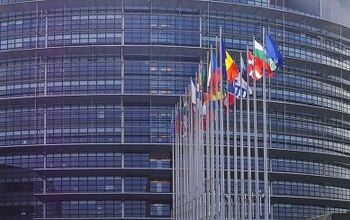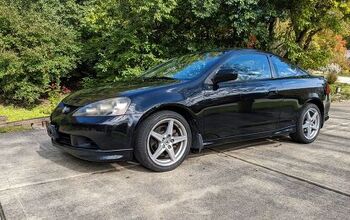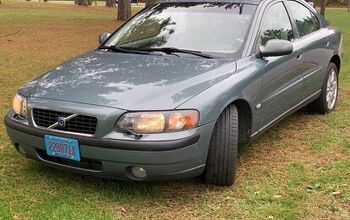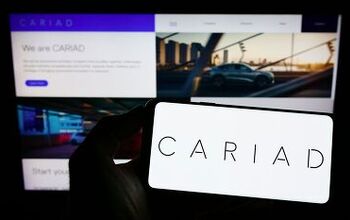Ford Fires Back Against Europe's "War On Cars"
After Greenpeace attacked Volkswagen for opposing proposed increases in the EU’s emissions regulation, Ford is joining the opposition to tough EU proposals. Ford Europe CEO Stephen Odell railed against the EU’s recent White Paper On The Future Of Transport [ PDF here], which calls for (among other things):
-“A higher share of travel by collective transport, combined with minimum service obligations”
-“The use of smaller, lighter and more specialised road passenger vehicles”
-“Road pricing and the removal of distortions in taxation [to] also assist in encouraging the use of public transport and the gradual introduction of alternative propulsion”
-All in the pursuit of the goal: “Halve the use of ‘conventionally-fuelled’ cars in urban transport by 2030; phase them out in cities by 2050; achieve essentially CO2-free city logistics in major urban centres by 203”
Now what about that plan might worry an auto executive?
Automotive News Europe [sub] hosted the conference at which Odell lashed out against what he called a “hugely disappointing document,” and report:
Odell said the EU had a critical role to play in developing transport strategy and in setting future policy frameworks, but wanted proposals which covered any collateral damage to the region’s automakers that they could cause.
The current proposals, which include a general shift from road to rail and shipping by 2025, Odell says is “unrealistic and one-sided”. “Such radical proposals require further discussion and reflection, and they need to respect the principles of technical neutrality and freedom of consumer choice,” he said.
He added the EU proposals could discourage essential research and development projects in Europe, and significantly reduce employment in the region.
“We have to consider transport policy not only as part of a wider industrial policy, but also in its effects on energy policy,” he said.
By US standards, the document’s idealistic goals are almost laughable. But, as we recently discussed, Europe and the US have very different perspectives on cars and cities. Still, Odell effectively argues that Europe’s overcapacity-plagued auto industry is fragile enough to sustain serious damage if principles allow regulators in Brussels to lose sight of reality. And, based on another of the White Paper’s goals, at least a few have:
By 2050, move close to zero fatalities in road transport. In line with this goal, the EU aims at halving road casualties by 2020. Make sure that the EU is a world leader in safety and security of transport in all modes of transport.
Again, a noble-sounding goal… but practical? What will Europeans be asked to pay for a guarantee of future accident- and idiot-proof roads? Taxes, certainly, but what about privacy? And, as Odell points out, where is consumer choice in any of this? Given the higher rate of fatalities among motorcycle riders, will motorcycles be made illegal just as high-horsepower cars are slowly but surely being made ever less attainable? The answer, of course, is “yes”… which, according to the document, is also where consumer choice comes in.
Price signals play a crucial role in many decisions that have long-lasting effects on the transport system. Transport charges and taxes must be restructured in the direction of wider application of the ‘polluter-pays’ and ‘user-pays’ principle. They should underpin transport’s role in promoting European competitiveness and cohesion objectives, while the overall burden for the sector should reflect the total costs of transport including infrastructure and external costs. Wider socioeconomic benefits and positive externalities justify some level of public funding, but in the future, transport users are likely to pay for a higher proportion of the costs than today. It is important that correct and consistent monetary incentives are given to users, operators and investors.
And here’s where I start to agree with the document: I’m all for pricing externalities into the price of oil, and if I lived on a small, crowded continent like Europe, I’d probably be more inclined to support congestion pricing as well. What I’m not so fond of is the “here is your future, enjoy the hell out of it” tone that comes through in so much of the White Paper, in passages like this one:
More resource-efficient vehicles and cleaner fuels are unlikely to achieve on their own the necessary cuts in emissions and they would not solve the problem of congestion. They need to be accompanied by the consolidation of large volumes for transfers over long distances. This implies greater use of buses and coaches, rail and air transport for passengers and, for freight, multimodal solutions relying on waterborne and rail modes for long-hauls.
If you’re pricing externalities into oil, why won’t the rest of these problems work themselves out? The auto industry groans and shrugs its shoulders when emissions regulations come out, but when government start calling, in effect, for the end of an industry, you’re going to hear more anger from people like Odell. And why not? As he points out
Let us all remember that the auto industry is one of the world’s great growth industries. It’s estimated the annual global vehicle market will be around 95 to 100 million units a year by mid-decade, and about 112 million vehicles by 2020. That’s 112 million vehicles by 2020 that have to be designed, engineered and built somewhere in the world – So why not here in Europe?
Meanwhile, here’s something else to consider: with heavy Gulf State investment in the European auto industry, why wouldn’t Europe’s automakers will continue to fight over the EU’s grand vision of the future of transport?
More by Edward Niedermeyer
Latest Car Reviews
Read moreLatest Product Reviews
Read moreRecent Comments
- Lichtronamo Watch as the non-us based automakers shift more production to Mexico in the future.
- 28-Cars-Later " Electrek recently dug around in Tesla’s online parts catalog and found that the windshield costs a whopping $1,900 to replace.To be fair, that’s around what a Mercedes S-Class or Rivian windshield costs, but the Tesla’s glass is unique because of its shape. It’s also worth noting that most insurance plans have glass replacement options that can make the repair a low- or zero-cost issue. "Now I understand why my insurance is so high despite no claims for years and about 7,500 annual miles between three cars.
- AMcA My theory is that that when the Big 3 gave away the store to the UAW in the last contract, there was a side deal in which the UAW promised to go after the non-organized transplant plants. Even the UAW understands that if the wage differential gets too high it's gonna kill the golden goose.
- MKizzy Why else does range matter? Because in the EV advocate's dream scenario of a post-ICE future, the average multi-car household will find itself with more EVs in their garages and driveways than places to plug them in or the capacity to charge then all at once without significant electrical upgrades. Unless each vehicle has enough range to allow for multiple days without plugging in, fighting over charging access in multi-EV households will be right up there with finances for causes of domestic strife.
- 28-Cars-Later WSJ blurb in Think or Swim:Workers at Volkswagen's Tennessee factory voted to join the United Auto Workers, marking a historic win for the 89- year-old union that is seeking to expand where it has struggled before, with foreign-owned factories in the South.The vote is a breakthrough for the UAW, whose membership has shrunk by about three-quarters since the 1970s, to less than 400,000 workers last year.UAW leaders have hitched their growth ambitions to organizing nonunion auto factories, many of which are in southern states where the Detroit-based labor group has failed several times and antiunion sentiment abounds."People are ready for change," said Kelcey Smith, 48, who has worked in the VW plant's paint shop for about a year, after leaving his job at an Amazon.com warehouse in town. "We look forward to making history and bringing change throughout the entire South." ...Start the clock on a Chattanooga shutdown.

































Comments
Join the conversation
it is impossible to idiot proof roads in Europe. It would be far easier to just ban the French and Belgians from driving. especially those crazy scooter drivers. ugh